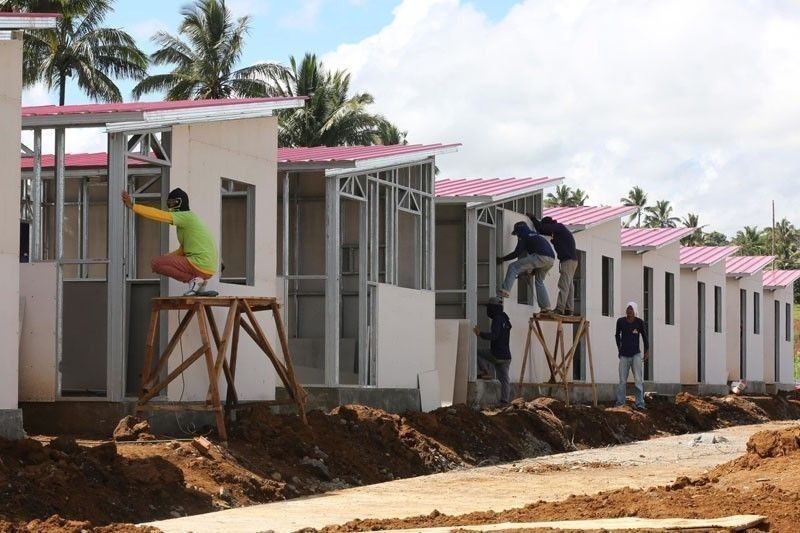Housing department laments P6.2-billion budget too small

MANILA, Philippines — The Department of Budget and Management–approved P6.2-billion budget for the newly created Department of Human Settlements and Urban Development (DHSUD) will definitely take its toll on the mass housing projects of the Duterte administration, an official warned.
“Definitely with that budget, we could not reach our target. This is the sad state of the housing sector with the budget being given by the DBM,” Secretary Eduardo del Rosario lamented during a recent budget hearing at the House of Representatives.
The DHSUD chief said that such meager allocation would only allow the agency to build 12,161 housing units next year instead of its original target of 101,000 units based on the initial proposal of P48.8 billion, which was drastically cut to 12.8 percent of the amount.
Del Rosario told the House committee on appropriations that based on the Philippine Development Plan or PDP for 2017 to 2022, their target should be 131,000 housing units per year. Hence, there will definitely be a disconnect between the PDP and the current approved budget.
Marikina Rep. Stella Luz Quimbo, whose lawyer-husband Miro used to head Pag-IBIG during the time of former president Gloria Macapagal- Arroyo, warned that the biggest losers are the National Housing Authority and the Social Housing Finance Corporation.
The neophyte opposition lawmaker said the NHA asked for a budget of P33.5 billion but was given only P3.2 billion. That of the SHFC, which asked for P10.12 billion, was also slashed to only P1.3 billion.
“This is really a big one, I’ve never seen cuts as big as these,” Quimbo observed.
She said the SHFC’s utilization rate is a negative because the agency is actually using its own funds.
In his budget message, President Duterte instructed the DHSUD to speed up the delivery of financing for shelters, particularly those for the poor.
At least P642 million was allocated for the department (the amount still excludes those allocated to other attached agencies), its first ever, in the proposed P4.1-trillion national budget for 2020 that was submitted to Congress last week.
This amount was for the DHSUD “proper,” and is on top of the funds from attached agencies earmarked for housing loans and assistance.
“This administration has believed that providing a house for every Filipino family goes beyond merely giving them a roof over their heads and walls around their belongings. It includes the assurance of safety and security, which transforms every house into a sustainable and livable home for the family,” Duterte said.
The law creating the DHSUD, signed last February, was authored by then senator Joseph Victor Ejercito, Sen. Sonny Angara, then speaker Arroyo, and Negros Occidental Rep. Alfredo Benitez, among others.
Duterte said he has instructed his economic managers to prioritize the operationalization of the DHSUD, which will “strengthen policymaking and regulation to ensure that its key housing agencies will have enough in their war chest to address shelter issues, and will maximize resources to make our communities safer and more secure.
Various housing-related government-owned and controlled corporations (GOCCs) and agencies were attached or consolidated with the new department.
They include the National Housing Authority (NHA); Housing and Land Use Regulatory Board; National Home Mortgage Finance Corp. (NHMFC); Home Development Mutual Fund; Home Guaranty Corp., and Social Housing Finance Corporation (SHFC).
For 2020, the SHFC will channel P897 million for the Housing Program for Informal Settler Families residing in danger areas in Metro Manila, and provide houses with land tenure security to some 8,711 ISFs.
The NHA was mandated to spend P3.3 billion next year to construct 3,517 housing units on top of those pending from their remaining funds this year as of June 30 amounting to P8.1 billion.
The NHMFC is slated to disburse P1 billion for its Socialized Housing Loan Take-Out of Receivables to buy loan receivable from socialized housing “originators” to improve low-income families’ access to financing.
The country’s housing backlog is expected to hit 6.8 million by 2022.
During the House hearing, which was presided by northern Samar Rep. Paul Daza, other lawmakers also took advantage of the deliberations to inquire about the status of their individual concerns, among them the housing for Typhoon Yolanda victims and the 2017 Marawi siege.
Women’s group Rep. Arlene Brosas of Gabriela cited the Commission on Audit report about the delay in the implementation of housing projects for the Yolanda victims since only 117,167 housing units were completed out of the targeted 203,000 units since 2013.
Marcelino Escalada, general manager of the National Housing Authority, pointed out that the reckoning date should not be 2013 when the typhoon struck, but from the date DBM released funds for that purpose.
“The P59-billion budget was not released to the NHA in 2013. The NHA got the rest of the remaining funds of P5.4 billion only this year,” he said.
He added that NHA did not cause the delays as the construction periods are fixed or specified in the government contracts.
Muslim Rep. Yasser Alonto Balindong of Lanao del Sur, meanwhile, inquired about the proposed budget for the Marawi rehabilitation in 2020.
“When can we say that the Maranao homeland is fully restored?” Balindong asked. – With Paolo Romero
- Latest
- Trending
































